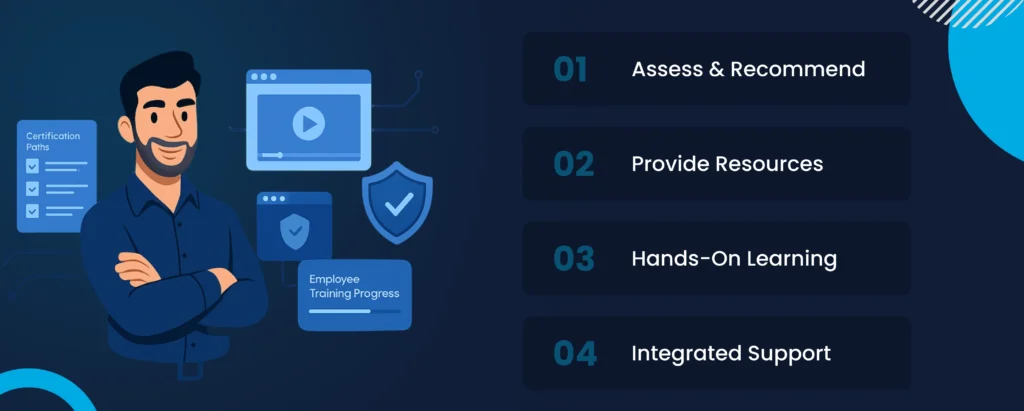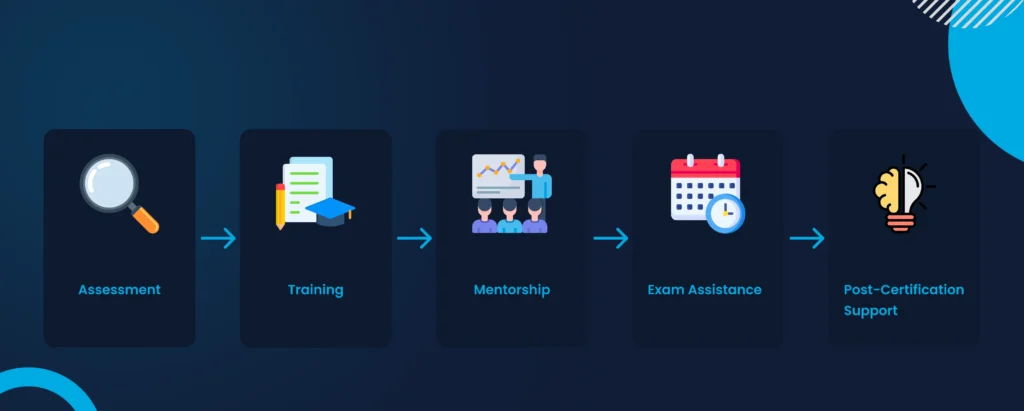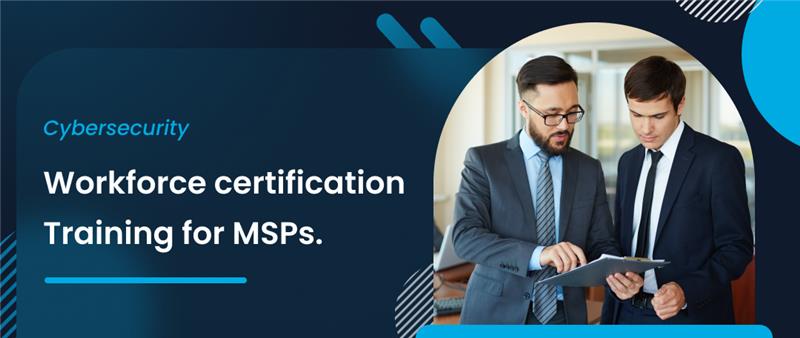Cybersecurity workforce certification training is the process of teaching employees the skills and knowledge needed to earn industry-recognized cybersecurity certifications. In simple terms, it means guiding your team to become certified in cybersecurity fundamentals and best practices. For businesses of all sizes, having a certified cybersecurity workforce is important: it validates that employees know how to protect sensitive data and defend against cyber threats. As an MSP (Managed Service Provider), you’re in a unique position to support this training for your clients. Cybersecurity workforce certification training. You might even be exploring free online cybersecurity workforce certification training resources to help your clients’ teams. However, simply relying on free materials isn’t enough – businesses need a structured program to truly build skills, pass certification exams, and apply cybersecurity knowledge on the job.
Why Cybersecurity Workforce Certification Training Matters
Every organization today faces cyber risks. Training a workforce for cybersecurity certification helps companies ensure their employees are qualified to safeguard systems and data. Key reasons this training matters include:
- Stronger Security Posture: Certified team members have proven knowledge to implement security measures and respond to incidents. This reduces the risk of breaches. In fact, a majority of data breaches involve some form of human error , so having well-trained, security-conscious staff is a must.
- Compliance and Trust: Many industries and regulations require staff to be trained or even certified in security. Having employees with certifications (or at least documented training) helps businesses meet compliance obligations and avoid penalties. It also builds trust with clients and partners when you can demonstrate that your IT team is certified and following best practices.
- Workforce Development: Encouraging certification shows employees that the company invests in their professional growth. It boosts morale and retention while also filling cybersecurity skill gaps internally. Given the shortage of skilled cybersecurity professionals, developing in-house talent is often more practical than hiring from outside.
For small and mid-sized businesses that rely on MSPs, achieving these benefits can be challenging without guidance. That’s where MSPs add value by coordinating and supporting cybersecurity training as part of their services.
Why MSPs Should Support Cybersecurity Workforce Certification Training

MSPs are well-positioned to help businesses build a cyber-ready workforce. You manage IT and security across multiple clients, so you understand the common vulnerabilities and the training needs in each environment. By adding workforce certification training to your offerings, you can:
- Identify the Right Training Path: As an MSP, you can assess a client’s security needs and recommend which cybersecurity certifications or training programs their team should pursue (for example, network security for a retail business vs. compliance training for a healthcare provider).
- Provide or Curate Training Resources: You can connect clients with quality courses, whether through partner training providers, online certification prep classes, or guided study programs. While free online resources are a starting point, MSPs ensure the training is comprehensive and aligned with the client’s goals.
- Offer Hands-On Experience: MSPs can give client employees practical experience by involving them in routine security tasks under supervision. This on-the-job learning reinforces formal training and helps employees apply what they learn for their certification exams.
- Integrate Training into Services: By managing training schedules, sending reminders, and tracking progress, you make the certification journey easier for clients. This turns training into an ongoing service rather than a one-time event. In doing so, your MSP becomes an even more indispensable partner in the client’s operations.
Ultimately, supporting certification training allows you to deliver end-to-end cybersecurity solutions – not only managing technology for clients but also empowering their people to use that technology safely.
What cybersecurity certifications do small businesses need?
Small businesses don’t necessarily need every certification under the sun, but there are a few core cybersecurity certifications that can greatly strengthen their security posture. Which ones are needed depends on the business and its IT staff roles, but common examples include:
- CompTIA Security+: An entry-level certification that validates fundamental security knowledge. Security+ covers basic network security, risk management, and threat response, making it a popular starting point for IT staff in small companies. Many businesses see Security+ as a must-have for any administrator or technician who handles sensitive data.[HB1]
- (ISC)² CISSP (Certified Information Systems Security Professional): A more advanced certification often pursued by senior IT managers or security officers. CISSP covers a broad range of security domains (from cryptography to security policy) and is a gold standard for demonstrating cybersecurity expertise. While it requires experience, having a CISSP-certified consultant or employee can reassure clients and regulators that the business takes security seriously.
- Certified Ethical Hacker (CEH) or Similar: For businesses particularly concerned with testing their defenses, certifications like CEH validate skills in finding and addressing vulnerabilities. An MSP serving a client who needs penetration testing might ensure someone on the team has this kind of certification.
- Vendor-Specific Certifications: Depending on the technology in use, a small business might benefit from vendor-focused certs. For example, a company using Microsoft 365 and Azure might look for Microsoft Certified: Azure Security Engineer or MS-500 (Security Administration) certifications. These prove expertise in securing those specific platforms.
How can MSPs help clients get certified in cybersecurity?

MSPs can play a pivotal role in guiding and assisting their clients’ employees through the certification process. Here are several ways MSPs help clients get certified in cybersecurity:
- Assess and Recommend: First, the MSP evaluates the client’s environment and goals. For example, if a client must comply with certain regulations, the MSP might recommend certifications like Security+ or CISSP for their IT staff. This ensures the chosen certification aligns with business needs.
- Provide Training Materials or Courses: MSPs often partner with training providers or utilize online courses to help employees study for exams. You might offer access to certification prep classes, study guides, or even organize workshops.
- Mentorship and Study Support: An MSP’s experts can mentor the client’s employees who are pursuing certifications. This could mean setting up weekly check-ins to discuss difficult topics, sharing real-world insights to enrich the textbook knowledge, or creating practice scenarios.
- Exam Scheduling and Incentives: You can help manage the logistics by scheduling certification exams for the employees when they’re ready and possibly negotiating group discounts. Some MSPs include incentives like covering the exam fee upon successful certification.
- Post-Certification Follow-up: After employees earn a certification, MSPs continue to support them. You ensure they apply their new skills in the client’s day-to-day operations (for instance, implementing the security improvements they learned).
A study on how compliance frameworks impact cybersecurity strategies: Meeting cybersecurity compliance requirements strengthens organizational security, as examined in this research on compliance and trust
.
Cybersecurity Awareness Training: The Essential Layer
While technical certification training is vital for IT professionals, not every employee at a client site will be aiming for a certification like Security+ or CISSP. Yet every employee needs basic cybersecurity awareness. This is where Clip Training comes in as an essential layer in your training offerings. ClipTraining does not offer certification courses directly; instead, it provides foundational cybersecurity awareness training that complements certification prep and ensures non-technical staff are compliant, alert, and policy aligned.
For MSPs, including cybersecurity awareness training as part of the service is a win-win. You ensure that the knowledge from formal certifications is reinforced by a culture of security across the entire organization. Even the best-certified IT manager needs the receptionist and the sales team to practice good security hygiene.
Clip Training makes this scalable: it’s a cloud-based, multi-tenant platform designed for MSPs to roll out easily. You can deploy training to all your clients in minutes, track their compliance with training modules, and even brand the portal with your MSP’s identity. This not only improves your clients’ security but also deepens your role as a trusted advisor, since you’re helping educate every level of the organization.
Conclusion: Strengthen Your Clients’ Security Workforce Today
As an MSP, you have the opportunity to improve your clients’ security from both angles – qualified experts and aware employees. Cybersecurity workforce certification training ensures the key IT staff have the credentials and skills to protect the business, and ClipTraining’s awareness platform ensures the whole team is vigilant and compliant every day. This combined approach reduces risks, meets compliance requirements, and gives your clients confidence that their people are ready to face cyber threats.
Ready to empower your clients with a certified, security-aware workforce?
Book a demo with Clip Training today to see how our platform fits into your service plans. Let’s work together to keep your clients safe by making cybersecurity training a core part of your MSP offering


